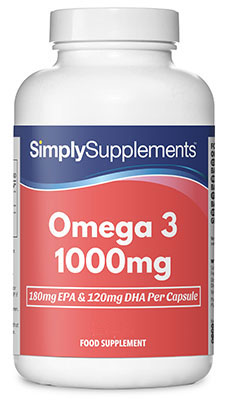Health Benefits of Omega 3

Everyone has heard of omega 3, and likely knows some of the ways in which it benefits health, but what actually is omega 3 oil?
What Are Omega 3 Polyunsaturated Fatty Acids (PUFAs)?
The omega 3s are a family of polyunsaturated fats. Fats are classified by their chemical structure, and the difference between omega 3 fatty acids and their kin the omega 6 and omega 9 fats can only be observed at molecular levels.
Principally, these different fats are known as “polyunsaturated” because of the carbon bonds that join the various molecules together. This might not sound very exciting but it entirely changes how they behave by preventing binding to hydrogen molecules. This helps to give them their unique properties.
The omega 3 fats obtained their name because their first carbon double-bond occurs at the beginning of the 3rd receptor site. In the same fashion, the omega 6 fats first double bond occurs at the 6th carbon and so on.
Although there are more omega 3 fats found in the world, the three that carry the most powerful benefits to human health are Eicosapentaenoic Acid (EPA), Docosahexaenoic Acid (DHA) and Alpha-Linolenic Acid (ALA). EPA and DHA are exclusively found in foods of marine origin such as oily fish and seafood, whereas ALA is found in plant based foods such as walnuts and flaxseeds.
Now we have got the chemistry out of the way, let’s delve deeper into why everyone should be regularly including the omega 3s in their diet.
What Are the Benefits of Omega 3?
Omega 3 oils are one of the most popular supplements on the market – but why do so many people rely on them?
Regulating Inflammation
Many leading medical experts believe that a high omega 6: omega 3 ratio, which is typical of many western diets, is a cause of chronic inflammation that leads to disease. Although the omega 6 fat linoleic acid is essential (because the body cannot create it), it is believed that an excess has the potential to stimulate excessive inflammation.
It is important to note that acute inflammation is necessary for good health, as it promotes cellular repair, supports immune function and even helps the body grow and adapt to exercise. However, when inflammation is chronically high, inflammatory markers in the body can stimulate disease progression. By decreasing the amount of omega 6 in the diet, whilst subsequently increasing omega 3 intake, leading experts believe this should help ensure inflammation is healthy and not detrimental.
Now we have seen why the anti-inflammatory effects of omega 3s can be beneficial, let’s have a look at some other key benefits.
Heart Health
 One of the ways that omega 3 oils benefit the heart is thanks to the aforementioned reduction in inflammation, which subsequently protects both the heart and the blood vessels. There is also good evidence showing that these essential fats can reduce blood clotting and may be beneficial to those who suffer from arrhythmias (an irregular heartbeat).
One of the ways that omega 3 oils benefit the heart is thanks to the aforementioned reduction in inflammation, which subsequently protects both the heart and the blood vessels. There is also good evidence showing that these essential fats can reduce blood clotting and may be beneficial to those who suffer from arrhythmias (an irregular heartbeat).
Researchers have long noted that omega 3 oils can be effective at reducing high blood pressure. It is thought that these fatty acids can relax the blood vessels and make them more sensitive to the effects of nitric oxide. Both of these features help to control blood pressure, reducing the risk of complications such as heart attacks and strokes.
The omegas 3s also have strong evidence behind them for improving blood lipid profiles. Firstly, they have a pronounced effect on triglyceride levels. In simple terms, triglycerides are a fat in the blood. High levels of triglycerides are a risk factor for heart disease and can cause further problems by decreasing HDL (‘good’) cholesterol.
Very recently, researchers have seen that triglycerides have the ability to cross the blood-brain barrier, with high levels resulting in insulin and leptin resistance (an appetite hormone). Insulin resistance can subsequently lead to diabetes, whereas leptin resistance can contribute to weight gain and obesity.
Diets rich in unsaturated fats, especially the omega 3s, are well-known to decrease triglyceride levels and also support healthy HDL levels, helping to protect against heart disease. A win-win! Daily fish oil provision has consistently shown to decrease triglycerides by as much as 15-30% in a matter of weeks, which is pharmaceutical-grade potency.
Vision
It has been consistently shown that omega 3s exert a powerful effect on eye health. It appears that their contribution to an optimal omega 6:3 ratio is protective against retinal angiogenesis, which is where abnormal numbers of blood vessels grow in the retina, often leading to blindness. Angiogenesis can be a result of diabetic complications, so alongside positive lifestyle changes, incorporating regular omega 3 into the diet could be particularly beneficial for diabetics.
Of the various omega 3 oils known to the medical community it is believed that DHA exerts the most benefit, having an important role in maintaining capillary integrity, inflammation reduction and also helping the function of the optic nerve. DHA is thought to be especially important for pregnant women and children up to the age of one, as it contributes to visual development. It is thought that an intake as small as 250mg a day is all that is needed to support healthy vision.
Cognitive Function / Healthy Ageing
Omega 3 supplements are very popular with older adults and for good reason. Aside from helping to maintain the health of the heart and eyes, they also help support good cognitive function. It is known that the omega 3 oils from fish are especially strongly associated with a decreased risk of dementia. Specifically, EPA has been shown to help combat the reduction in brain size due to advancing age.
Strong musculature is crucial for more mature individuals looking to maintain their independence. Unfortunately, more and more adults are suffering from a condition called sarcopenia – the age related loss of muscle. This can be negated by eating sufficient protein and engaging in regular muscle strengthening activities. The research has also consistently shown that omega 3 supplementation helps to maintain or grow the muscles, even in adults over the age of 80! It is thought that their anti-inflammatory properties help to slow protein degradation, meaning there is a more positive balance towards protein synthesis and subsequently muscle growth.
Child Development
 The omega 3s are known to be of great importance for pregnant and lactating women, as they support the healthy development of both the foetus and infant. The European Food Safety Authority (EFSA) acknowledges that pregnant and lactating women should consume 250mg of EPA & DHA per day to help the development of the brain and eyes of their child. Research has also shown that maternal omega 3 intake has been associated with a higher birth weight.
The omega 3s are known to be of great importance for pregnant and lactating women, as they support the healthy development of both the foetus and infant. The European Food Safety Authority (EFSA) acknowledges that pregnant and lactating women should consume 250mg of EPA & DHA per day to help the development of the brain and eyes of their child. Research has also shown that maternal omega 3 intake has been associated with a higher birth weight.
Published scientific studies have also shown that the omega 3s are also beneficial to children as they can help with memory and learning. The benefit also seems to be accentuated in children with a low dietary intake of fish.
Mental Health
Given the trend for omega 3s to support numerous areas of brain development and cognition, it comes as no surprise that a daily intake of these nutrients has been shown to improve other aspects of mental health.
Notably, a meta-analysis of randomised control trials found that daily EPA intake significantly improved symptoms in severely depressed individuals. Although the effect wasn’t as pronounced in those with mild depression, EPA was shown to work synergistically with prescription anti-depressants. It is important to note the quality of this study, as a meta-analysis of randomised control trials is widely regarded as being at the top of the hierarchy of scientific evidence.
Although scientists do not fully understand why the omega 3s impart positive effects on psychological wellbeing, there are a few plausible explanations. Firstly, DHA is known for its importance in the structure of neurons and also neurotransmission within the brain. Because of this, it is thought that DHA and to a large extent EPA help the healthy transmission of signals between brain cells.
Further to this, researchers believe that the omega 3s anti-inflammatory effect is important to the brain specifically. Regular omega 3 intake has been shown to decrease the activity of numerous inflammatory markers – the same ones that have been linked to depressive symptoms. Again, the positive benefits seem to be more potent in those who don’t eat oily fish on a regular basis.
How Much Omega 3 Should I Take?
The Department of Health currently recommends that everyone should consume two portions of fish per week with one of these being an oily fish such as mackerel, salmon, fresh tuna or sardines for example. This should ensure an adequate intake of the omega 3s EPA & DHA.
The recommended dosage of EPA and DHA will vary depending on the reason for supplementation. For those who are taking an omega 3 supplement to make up for their lack of dietary fish, 250mg of EPA and DHA per day are widely regarded as good values to aim for.
If, however, you are using fish oils for the management of blood pressure or triglyceride levels, a substantially higher amount is required. According to EFSA, to exert these positive actions a combined intake of 2g of EPA and DHA per day is required. This can come from fish, supplements or a mixture of the two.
With regards to ALA, EFSA state that people see benefits to their cholesterol levels when obtaining 2g per day. Again this can be achieved through food, supplements or a mixture. For reference, flaxseeds contain 2.2g of ALA per tablespoon (~15g), whilst walnuts contain around 0.7g for the same serving size.
The body does have the ability to convert a certain amount of ALA to EPA and DHA. However, this is only thought to be a conversion rate as small as 5-15%, which can be negatively affected by illness, stress and a high omega 6 intake. Because of this, there is no real substitute to a regular intake of fish or a high-quality fish oil supplement.
What Are the Side Effects of Omega 3?
 Due to the omega 3 fats being essential for health, it is unsurprising that the positive effects massively outweigh any side effects. Nonetheless, it is important to discuss them.
Due to the omega 3 fats being essential for health, it is unsurprising that the positive effects massively outweigh any side effects. Nonetheless, it is important to discuss them.
For the most part, symptoms of fish oil consumption either via fresh fish or a fish oil supplement have only minor side effects such as belching, flatulence and nausea. Obviously someone with a fish allergy should avoid fish intake and supplementation, but instead can enjoy a diet rich in ALA to ensure some EPA and DHA is naturally produced in the body.
Certain fish oil supplements can sometimes cause an unpleasant taste in the mouth or ‘fishy burps’. In an attempt to avoid this, it is widely recommended to take fish oil supplements alongside a meal. All omega 3s, including ALA, can also thin the blood and slow wound healing. If you are on medication that slows blood clotting, high dietary intake of the omega 3s may not be advisable. Similarly, it may be wise to stop intake around the time of a surgical procedure to prevent excessive bleeding. As always, speaking to your doctor/GP is highly recommended.
There is also persistent concern with regards to the contaminants in fish, with mercury being one of significant interest. However, it seems that unless eating shark and whale meat regularly there is no major cause for concern! Research has shown that salmon (wild and farmed), cod, mackerel, trout, shrimp all have an almost undetectable amount of mercury present. Sea bass, halibut, fresh and tinned tuna were all slightly higher but again only in minute quantities.
High-quality fish oil supplements that have been subject to molecular distillation are typically even lower in contaminants, which again shows that there is no major cause for concern.
Summary
Hopefully this article has stimulated those of us who do not regularly eat oily fish, walnuts and flaxseeds to incorporate these foods more often into the diet, given the plethora of health benefits. Let us summarise the content in the take home points:
- The omega 3s are a family of polyunsaturated fats, which include EPA and DHA (from fish) and ALA which is found in the highest concentrations in walnuts and flaxseeds.
- The lack of omega 3 and the surplus of omega 6 in the typical western diet is thought by many medical experts to be a primary contributor to numerous chronic diseases.
- Although the body has the capacity to make EPA and DHA from ALA, the conversation rate is so small that many believe it is essential for optimal health to obtain EPA and DHA from the diet.
- The benefits of omega 3s are far reaching, with their primary benefits being the regulation of inflammatory markers, cardiovascular health, cognitive function, vision, psychological health and healthy child development.
- Unfortunately, two thirds of us in the UK do not meet the recommended 2 portions of fish per week, with one being an oily fish. Increasing dietary sources of fish or supplementing with a high-quality fish oil will therefore be beneficial for most of us.
- The typical dosage of the omega 3s will depend on different circumstances. For supporting a healthy heart, brain or eyes, or when pregnant or lactating, 250mg of EPA and DHA per day is beneficial. For improving blood pressure, triglycerides or mental health status, doses of 2g per day are more appropriate. 2g of ALA per day is also the amount thought to provide beneficial health properties.
- With all of the omega 3 fats, the side effects are uncommon and usually minor. However, caution is advised in individuals who are having a surgical procedure or are on blood-thinning medication as the omega 3s can cause excessive bleeding. The concerns about mercury contamination with fish intake seems to have been overstated, with only miniscule amounts found in most commonly consumed fishes or fish oil supplements.

Sources:
http://onlinelibrary.wiley.com/doi/10.2903/j.efsa.2010.1796/abstract
https://heartuk.org.uk/health-and-high-cholesterol/triglycerides
https://www.nature.com/articles/ijo2017231
https://www.ncbi.nlm.nih.gov/pubmed/10977042
https://www.ncbi.nlm.nih.gov/pubmed/21775113
https://www.ncbi.nlm.nih.gov/pubmed/22345681
https://www.ncbi.nlm.nih.gov/pmc/articles/PMC533861/
https://www.ncbi.nlm.nih.gov/pubmed/20633905
http://journals.plos.org/plosone/article?id=10.1371/journal.pone.0046832
https://www.ncbi.nlm.nih.gov/pubmed/23515006
https://www.ncbi.nlm.nih.gov/pubmed/21975919
https://www.ncbi.nlm.nih.gov/pubmed/20439549
http://n.neurology.org/content/78/9/658
https://www.ncbi.nlm.nih.gov/pubmed/20434961
https://www.ncbi.nlm.nih.gov/pubmed/18408140
https://www.ncbi.nlm.nih.gov/pubmed/22218156
https://www.ncbi.nlm.nih.gov/pubmed/21159787
http://onlinelibrary.wiley.com/doi/10.2903/j.efsa.2009.1007/abstract
http://onlinelibrary.wiley.com/doi/10.2903/j.efsa.2009.941/full
http://onlinelibrary.wiley.com/doi/10.2903/j.efsa.2009.1006/abstract

 Nicole
Nicole 

























